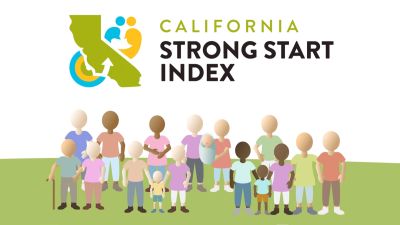CDN / CHHS COVID-Related Efforts Highlighted in Newest AISP Article
In its newest article, COVID-19 Crisis and Recovery, Actionable Intelligence for Social Policy (AISP) touted our partnership with the state and OpenLattice to build and launch mychildcare.ca.gov, an online tool to connect essential workers to available child care slots, as an example of how integrated administrative data has been applied – and proven helpful – in the context of state-level crisis response and rebuilding. In addition to reinforcing how such projects can meet immediate, pressing, and concrete family needs, the article also highlights how these efforts became opportunities to validate the CHHS Data Hub, a secure, cloud-based research enclave for hosting linked research data sets, which was at that time, still under development, and routinize processes related to efficient data sharing and analysis.
Congratulations, Lindsey!
On May 2nd, 2019, Lindsey Palmer, Research Assistant at the Children’s Data Network, passed her qualifying exam with distinction and advanced to candidacy for her doctorate. Her paper, “A Case Control Study of Suicide Risk Among Adolescents with a History of Alleged Maltreatment” presents a population-based analysis of the child protective service (CPS) histories of adolescents who died by suicide and examines the child maltreatment characteristics and system level responses associated with risk of adolescent suicide. We are so proud of you, and thrilled that you are part of the CDN team!
Congratulations, Eunhye!
Eunhye Ahn, Research Assistant at the Children’s Data Network passed her qualifying exam on May 12th, 2020, with distinction and has advanced to candidacy for her doctorate. In addition, she presented her paper, “Machine Learning for a Child Welfare System: Predicting Risk of Aging Out Among Foster Care Youth” during a CDN brownbag session, expertly highlighting the findings and facilitating discussion among the attendees. We are so proud of you, Eunhye, and thrilled to have you on our team.
CDN / CHHS Efforts Featured in Newest AISP Report
Actionable Intelligence for Social Policy published a new report today, Introduction to Data Sharing and Integration. This informative handbook provides a primer on the effective and ethical use of linked administrative data. We were pleased to see that the CHHS Record Reconciliation and Research Data Hub and the California Strong Start Index are presented as successful examples of how integrated data is being used to inform programs and policies. Hearty congratulations all around!
Now Live: Mychildcare.ca.gov
Californians working in essential sectors during the coronavirus (COVID-19) response need safe, reliable, and accessible child care options. The USC Children’s Data Network is honored to have played a significant role in the rapid development and operation of mychildcare.ca.gov, a searchable, web-based interface that connects essential workers across the state of California to quickly find timely, accurate information about the availability of local, licensed child care slots. Mychildcare.ca.gov was officially launched during Governor Newsom’s April 30th daily briefing. This ambitious effort required exceptional partnership and collaboration with the Governor’s Office, California Health and Human Services Agency (CHHS), California Department of Social Services (CDSS), California Department of Education (CDE), California Resource and Referral Network (CCR&RN), local Resource and Referral (RR) Agencies, Open Lattice, all 46,000+ child care providers across the state of California, and many more. As such, the Governor called mychildcare.ca.gov “profoundly important,” and the Children’s Data Network was credited, among others, for making this dream a reality.
Governor Newsom’s briefing can viewed in its entirety here: https://www.youtube.com/watch?v=3LGwY3jwGaY
Mychildcare.ca.gov can be accessed through the state’s coronavirus response homepage: https://covid19.ca.gov/childcare/
CHHS/CDN Partnership Featured in Health Affairs
Now Live in Health Affairs: Integrating Data To Advance Research, Operations, And Client-Centered Services In California. This article presents the background, context, outcomes, and value of the California Health and Human Services Agency / Children’s Data Network Record Reconciliation and Research Data Hub efforts, and, specifically, how agency-wide data integration has helped to shift discussions from the programs that administer services to the clients who are served. We are thrilled to have debuted this work in such a reputable journal and to have the this very public acknowledgement of our successful university-agency partnership.
Key Children’s Data Network Staff Tapped to Advise the California Cradle-to-Career Data System
Two Senior Children’s Data Network personnel have been invited to serve as advisors to the development of the California Cradle-to-Career Data System. Emily Putnam-Hornstein, PhD, Director of the Children’s Data Network and Associate Professor at the USC Suzanne Dworak-Peck School of Social Work, has accepted an invitation to serve of the Policy and Analytics Advisory Group. The Policy and Analytics Advisory Group will inform the interagency group’s discussions about how to ensure the data system supports research, evaluation, accountability, and optimization of publicly-funded services at the state level. In addition, John Prindle, PhD, Assistant Research Professor at the USC Suzanne Dworak-Peck School of Social Work, will be serving on the Common Identifier Sub-Committee. The Common Identifier Sub-Committee will include representatives from both the partner entities named in the legislation and individuals with experience linking individual records across data sets. This sub-committee is tasked with providing recommendations to the larger Workgroup regarding how to design the technical process that will be used to link student records across partner entities. We are honored to provide technical assistance and thought leadership around this exciting effort.
USC Research Gateway Scholars Program
CDN undergraduate student, Rachel Chen, has been accepted as a scholar in the USC Research Gateway Scholars Program. This 2-year program is an opportunity to propose and conduct formal research under the guidance of USC Faculty mentors and a gateway to pursuing graduate-level studies. Selected among a highly competitive pool of applicants, Rachel’s acceptance highlights her great potential to make a meaningful impact throughout her academic career. The CDN would like to congratulate Rachel on her achievements and hope she enjoys all of the exciting challenges and opportunities.
Strengthened Tool Promotes Equitable Investment in California Children and Families
New Data and Features Enhance the California Strong Start Index
A powerful tool that can help guide critical resources to California’s newborns and their families in need is now even stronger thanks to new features and richer data.
Today, the Children’s Data Network and the First 5 Association of California unveiled the newest iteration of the California Strong Start Index, a free online resource that uses statewide data to identify areas where babies, young children, and families may need more support. The enhanced index now features data on recent birth cohorts, from more geographical areas, and by racial and ethnic group.
“All babies deserve a strong start in life, regardless of their race, ethnicity, or where they were born and live,” said Kim Goll, First 5 Association Executive Committee President and Executive Director of First 5 Orange County. “It’s imperative that people with the power to make decisions about where funds are allocated understand the conditions into which our state’s babies are born. By consulting the Strong Start Index, they can ensure resources for young children and families go where they are needed most.”
Each year, nearly half a million infants are born in California. Their human, social, and material assets vary widely, with significant consequences for growth, resilience, and well-being throughout their life. Research emphasizes the importance of early childhood experiences in promoting positive adolescent and adult behaviors.
Since its launch in 2019, the Strong Start Index, funded by the Heising-Simons Foundation and with critical infrastructure support from First 5 LA and the Conrad N. Hilton Foundation, has helped government officials, service providers, and others identify areas where those assets might be lacking for newborns and their families. The data tool analyzes 12 indicators available in state birth records that researchers have found are related to positive outcomes throughout life.
Those indicators include family-related factors like being born to parents with a high school diploma or college degree, health-related factors such as healthy weight at birth, supportive resources like access to timely prenatal care, and financial benefits like the ability to afford and access health care.
“Research has consistently shown that these factors are tied to a greater likelihood of having healthy and thriving infants who grow into resilient adolescents and adults,” said Agnieszka Rykaczewska, Evaluation and Learning Manager at First 5 LA. “Because this index gathers data from across the state for all births each year, we can use it as a vital input to help us determine where more early childhood efforts should be directed.”
Strong Start Index scores are calculated by adding the number of assets available to each baby and averaging them at the census tract level. Detailed maps at the Strong Start Index website reveal neighborhoods where newborns have more or fewer supportive resources, ensuring that decision makers can guide investments to the communities with greatest need.
The site now includes data through 2017 and allows users to compare multiple years of data to understand how neighborhoods have changed over time. Users can also view Strong Start Index scores by city and federal legislative districts, and researchers and others can download the full dataset for independent analysis.
For the first time, information is also available by race and ethnicity, revealing disparities among infants from different backgrounds and born into different communities. For example, the racial/ethnic distribution of communities with the highest average number of assets look very different from the communities with the lowest average number of assets. Specifically, in 2017, communities characterized by births with the greatest advantages were also communities into which overwhelming numbers of white and Asian/Pacific Islander children were born. Meanwhile, Latino and black children found themselves born into communities with the least advantage and the lowest average number of assets. This is only one example of the information that can be gleaned from this dynamic policy and research tool.
“One of the goals of the Strong Start Index is to shine a light on the variation that exists in our communities,” said Emily Putnam-Hornstein, director of the Children’s Data Network and an associate professor at the USC Suzanne Dworak-Peck School of Social Work. “The racial and ethnic disparities confirm what we see playing out in our child care settings, schools, health clinics, and communities across California. And although these conditions at birth don’t predetermine the future of any given newborn, understanding differences can guide thoughtful support to ensure children with fewer resources find themselves on a level playing field with their peers.”
To learn more about The Strong Start Index, please visit strongstartindex.org.
CASSi in Action
The California Strong Start Index is being received as a valuable tool for equitably allocating resources within communities. Public, private, and philanthropic partners are using it to:
- Generate information related to racial / ethnic disparities (California Governor’s Office);
- Facilitate the identification of “Communities of Need” for the statewide California Home Visiting needs assessment (California Department of Public Health);
- Estimate number of slots for a universal, but also tailored Home Visiting program (First 5 LA, First 5 CA, California State Budget – May Revise);
- Identify communities faring better on the EDI than what would be ‘predicted’ using the CASSi (First 5 OC);
- Inform Impact Framework Monitoring Measures (First 5 LA);
- Augment and validate other local-level information (First 5 LA, First 5 Sonoma, First 5 Fresno, First 5 San Mateo, etc.)
- Inform community needs assessments (First 5 LA, First 5 Sonoma, First 5 Fresno, First 5 San Mateo, etc.)
- Inform strategic plans (First 5 LA)
- Enhance other datasets through overlays
In addition, it has been fully integrated into First 5 California’s statewide Home Visiting Workforce Study (RFP CFF 7554). Applicants are required to use the Strong Start Index as an anchor point to 1) project future home visiting needs; 2) justify proposed workforce investments; and 3) recommend geographic distribution of those resources in alignment with the distribution of vulnerable families across California.
We applaud this, and all other, efforts to make better use of existing data to inform programs and policies.
Please visit www.strongstartindex.org and project page to access the data, view the animation, explore detailed methodological documentation, download information by race/ethnicity, and to find detailed examples of how the strong start index is being used to facilitate equitable investment in the children and families of California.











